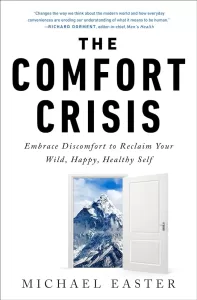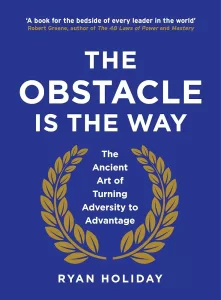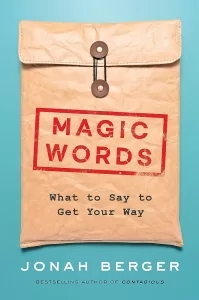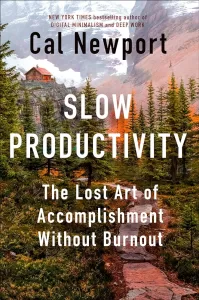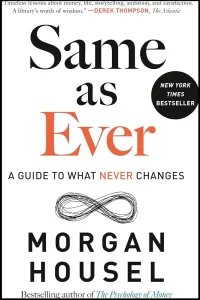Book Review: “The Comfort Crisis”
Book: The Comfort Crisis by Michael Easter
Reviewer: Bobby Powers
My Thoughts: 10 of 10
I'm amazed by the ground Easter covers in this book. I expected to learn about the benefits of exchanging my comfortable lifestyle and technology for the discomfort and challenges of the outdoors, but I got way more than I bargained for. Easter offers science-backed insights on exercise, nutrition, solitude, silence, addiction, stress, and more. The book is a one-stop shop for how to live a healthier, more peaceful life. Reading The Comfort Crisis prompted me to make several immediate changes to my daily routines. It's one of the most important, practical books I've read in years.
What I Learned from the Book
As our world has advanced, we've discovered countless ways to make ourselves more comfortable: sitting on padded couches instead of the ground, standing on escalators instead of trudging up staircases, eating prepackaged meals instead of killing our own food, etc. But each of these advancements has come at a cost.
Contrary to popular opinion, discomfort isn't a bad thing. Discomfort often develops resilience, burns calories, and helps us stay connected to the world around us. Counterintuitively, introducing more discomfort into our lives can help us become mentally and physically healthier.
Selected Quotes & Ideas from the Book
The Comfort Crisis
- "Most people today rarely step outside their comfort zones. We are living progressively sheltered, sterile, temperature-controlled, overfed, underchallenged, safety-netted lives."
- "I just had to take a look at my everyday life. I was comfortable, quite literally, every single moment. I awoke in a soft bed in a temperature-controlled home. I commuted to work in a pickup with all the conveniences of a luxury sedan. I killed any semblance of boredom with my smartphone. I sat in an ergonomic desk chair staring at a screen all day, working with my mind and not my body. When I arrived home from work, I filled my face with no-effort, highly caloric foods that came from Lord knows where. Then I plopped down on my overstuffed sofa to binge on television streamed from outer space. I rarely, if ever, felt the sensation of discomfort."
- "We lack physical struggles, like having to work hard for our livelihoods. We have too many ways to numb out, like comfort food, cigarettes, alcohol, pills, smartphones, and TV."
- "When a new comfort is introduced, we adapt to it and our old comforts become unacceptable. Today's comfort is tomorrow's discomfort. This leads to a new level of what's considered comfortable."
- Our modern comforts and new technological inventions have made us more comfortable, but also made us less active, which has created a slew of health problems in America:
- 32% of Americans are overweight and 38% are obese
- Nearly 1/3 have diabetes or prediabetes
- Overdose deaths have more than tripled in the last 20 years
- The US life expectancy fell in 2016, 2017, and 2018 due to increases in "diseases of despair" like depression, anxiety, addiction, and suicide
- "A radical new body of evidence shows that people are at their best—physically harder, mentally tougher, and spiritually sounder—after experiencing the same discomforts our early ancestors were exposed to every day. Scientists are finding that certain discomforts protect us from physical and psychological problems like obesity, heart disease, cancers, diabetes, depression, and anxiety, and even more fundamental issues like feeling a lack of meaning and purpose."
Choose a "Misogi" to Test Your Capabilities
- Misogi = An extremely difficult physical challenge that tests the body and mind
- "I believe people have innate evolutionary machinery that gets triggered when they go out and do really fucking hard things. When they explore those edges of their comfort zone." -Dr. Marcus Elliott, who pioneered the modern idea of taking a misogi to test yourself
- "In misogi we're using the artificial, contrived concept of going out and doing a hard task to mimic these challenges that humans used to face all the time. These challenges that our environment used to naturally show us that we're so removed from now." -Dr. Elliott
- "Misogi is not about physical accomplishment. It asks, 'What are you mentally and spiritually willing to put yourself through to be a better human?" -Nelson Parrish
- "In our model of misogi, there are only two rules. Rule number one is that it has to be really fucking hard. Rule number two is that you can't die...We're generally guided by the idea that you should have a fifty percent chance of success—if you do everything right." -Dr. Elliott
- "The human brain hates this construct. The brain wants nothing to do with failure. Especially if you execute perfectly on your side...I can tell you that nothing great in life comes with complete assurance of success. Engaging in an environment where there's a high probability of failure, even if you execute perfectly, has huge ramifications for helping you lose a fear of failure. Huge ramifications for showing you what your potential is." -Dr. Elliott
- Example misogis mentioned in the book:
- Stand-up paddleboarding 25 miles across the Santa Barbara Channel
- Hiking 15 hours in the wilderness with an 80-pound pack on your back
- Running a 10K if you've never run more than a couple miles
Put Yourself in Novel Situations
- "New situations kill the mental clutter. In newness we're forced into presence and focus."
- "Learning improves myelination, a process that essentially gives our nervous system a V-8 engine, creating stronger, more efficient nerve signals throughout our brain and body."
- "[Researchers at the University of Michigan found that] dementia significantly dropped in people who dedicated more of their lives to learning."
Loneliness Is Bad, But Solitude Can Be Good
- "Despite the fact that people today are rarely alone, we are increasingly lonely...People surround us at work, in the grocery store, during our commute, in our neighborhood. Even when are by ourselves, we are often 'with' the people who speak to us through our televisions, podcasts, or text messages. Yet nearly half of Americans say they're lonely, leading the US government to declare that we're facing a 'loneliness epidemic.'"
- "Being lonely increases your risk of dying in the next 7 years by 26 percent. Overall, it can shorten life by 15 years. That's equivalent to smoking a half a pack of cigarettes a day."
- "I can't help but think that in today's increasingly hyperconnected and tribal society—where we define ourselves by the group or movement we belong to—it's not a bad idea to occasionally be alone...Building 'the capacity to be alone' may be just as important for you as forging good relationships."
- "In solitude you can find the unfiltered version of you."
- "Building the capacity to be alone probably makes your interactions with others richer. Because you're bringing to the relationship a person who's actually go stuff going on in the inside and isn't just a connector circuit that only thrives off of others." -Matthew Bowker, PhD
Technology Is Causing Mental Health Issues
- "The average American each day touches his phone 2,617 times and spends 2 hours and 30 minutes staring at the small screen."
- "More than half of adults said they were under 'high stress' in 2017. Anxiety grew by 39 percent in a recent one-year period. Attention spans fells by 33 percent from 2000 to 2015. Depression diagnoses are up 33 percent since 2013."
- "I wouldn't pin [the growing mental health issues] on mobile technology one hundred percent, but I'd say it's ninety percent due to it." -Dr. Judson Brewer, professor of psychiatry at Brown University
- "A massive swell of Silicon Valley workers who develop mobile tech and apps don't allow themselves or their kids to use the Valley's products. One former Facebook exec told the New York Times that she is 'convinced the devil lives in our phones.' Another said that Silicon Valley tools are 'ripping apart the social fabric of society.'"
Spend Time in Nature
- "Most of us today rarely experience the natural world. More than half of Americans don't go outside for any type of recreation at all. That includes the simple stuff like walking and jogging."
- "American kids play outside 50 percent less than their parents did. Camping in the woods is down about 30 percent since 2006."
- The Biophilia Hypothesis: "We evolved in nature, and therefore have programmed within our genes a need to be in and connect with nature and living things." (Theory developed by biologist E. O. Wilson)
- "Nature holds the key to our aesthetic, intellectual, cognitive, and even spiritual satisfaction." -E. O. Wilson
- Scientists have discovered that spending time outside can help us feel calmer, sharper, and more productive while also decreasing our stress hormones, blood pressure, and heart rate.
- "I tell [people] it doesn't have to be complicated. Just passing through a park or by some trees on a walk to a coffee shop has benefits. Almost immediately when people are in nature or even see nature they report feeling better and their behavior changes...Having plants in your office can increase your productivity...There's other research that shows even having a view of nature out of a hospital window helps people recover quicker." -Rachel Hopman
- "Nerve-shaken, over-civilized people are beginning to find out that going to the mountains is going home; that wilderness is a necessity; and that mountain parks and reservations are useful not only as fountains of timber and irrigating rivers, but as fountains of life." -John Muir
Inject More Silence Into Your Life
- "Humans have increased the world's loudness fourfold."
- "Scientists at the University of Michigan say that more than 100 million Americans live with noise levels louder than what you'd hear standing next to a working washing machine or dishwasher. That's 70 decibels."
- "Our brains are wired to think loud = danger. We react by releasing adrenaline and cortisol, stress hormones that kick on the fight-or-flight response."
- "In fact, the world's number-one killer, heart disease, isn't just a consequence of too much couch and carbs. The World Health Organization found that the constant stream of decibels we live in is, quite literally, taking years off our lives. Too much noise was responsible for nearly 2,000 heart attack deaths in Europe. This is because stress increases can lead to heart disease."
- "Other studies show that background noise also impairs our attention, memory, learning, and interactions with others."
- "We also know that seeking the everyday silence that comes from shutting off devices can benefit our brain and body...Other research found that two minutes of silence led to the bigger drops in measures of relaxation like blood pressure and heart and breathing rate compared to a handful of other relaxation techniques."
Get in Touch with Hunger
- Low-level feelings of hunger are necessary for losing weight. "Embrace the discomfort of hunger. We must recognize that occasionally going without food up to 24 hours is a normal and even beneficial human state. And we must also understand and adapt to the fact that much of our hunger isn't real physiological hunger. Rather, it's often a cheap coping mechanism to comfort us against the discomforts of modern life."
- "Just 3 percent of the people who lose weight in a given year manage to keep it off. Their secret isn't some special food or exercise no one else has. It's their ability to get comfortable with discomfort."
- "'Comfort food' and 'stress eating' are common American vernacular, and studies show that real hunger now drives just 20 percent of eating."
- "People eat 550 more calories—a whole extra meal—after nights where they sleep just five hours versus eight, according to research conducted at the Mayo Clinic."
- "Another experiment found that 40 percent of people eat significantly more food when they're stressed."
- "Fast food and packaged food sales rose roughly 25 and 10 percent in America over the last five years."
- "Research from the University of North Carolina discovered that we're snacking 75 percent more than we were before 1978. Our snacks are also 60 percent larger and more likely to be ultraprocessed."
- "People who are at a consistently healthy weight don't have better genetics or a higher metabolism, and they don't magically burn more calories. They're just more likely to deal with stress by, like, going for a walk instead of eating. That's really the difference." -Trevor Kashey, nutrition expert
Our Ancestors Were Much More Active Than Us
- "Before we figured out animal husbandry and crop cultivation we were 'essentially professional athletes whose livelihood required [us] to be physically active,' said Harvard anthropologists. Our ancestors didn't 'work out,' because nearly all of their waking hours were spent doing things that today we would classify as exercise."
- "Studies show it was not uncommon for these hunters to run and walk more than 25 miles in a day. We call that a marathon. They called it 'picking up dinner.'"
- "Even doing nothing wasn't effortless. Our ancestors often rested in the squat position, which required they lightly activate nearly every muscle in their body or else topple over."
- "The CDC shows that we modern humans are fatter and less muscular than we were a decade ago. Which was when we were fatter and less muscular than we were the decade before that, and so on. Scientists say our impossible laziness—once exceedingly rare—is leading to dangerously low levels of muscle...Humans are slowly becoming as unique for our fatness and lack of fitness as we are for our intelligence."
- "The numbers suggest that our forefathers in just three-quarters of a day logged more activity than most of us now do in a week or two. And they basically stayed at this activity level until they died."
- "Even modern athletes are unimpressive compared to a run-of-the-mill ancient. The arms of the average prehistoric woman, for example, were 16 percent stronger than those of today's Olympic rowers, according to scientists at the University of Cambridge."
- "Health clubs became a staple of society beginning in the 1960s and '70s...Exercise was no longer a fact of life. It became a 30-minute class or hourlong session we tackled a few times a week."
Burn Calories by Rucking
- Rucking = Walking while carrying weight
- "'Ruck' is both a noun and a verb. It's a thing and an action. It's military-speak for the heavy backpack that carries all of the items a soldier needs to fight a war. And 'to ruck' or 'rucking' is the act of marching that ruck in war, or as a form of training for soldiers or civilians to get really, really fit."
- "You very rarely run in war, and never without weight. Never. But you're always trucking...Rucking is the foundational skill of being a Special Forces soldier. Any soldier for that matter." -Jason McCarthy, former Green Beret and founder of GORUCK
- "Rucking is strength and cardio in one. It's cardio for the person who hates running, and strength work for the person who hates lifting." -Jason McCarthy
- "A casual ruck burns somewhere between two and three times the calories of walking, according to scientists at the University of South Carolina."
Think you’d like this book?
Other books you may enjoy:
Other notable books by the author:
Want to become a stronger leader?
Sign up to get my exclusive
10-page guide for leaders and learners.
